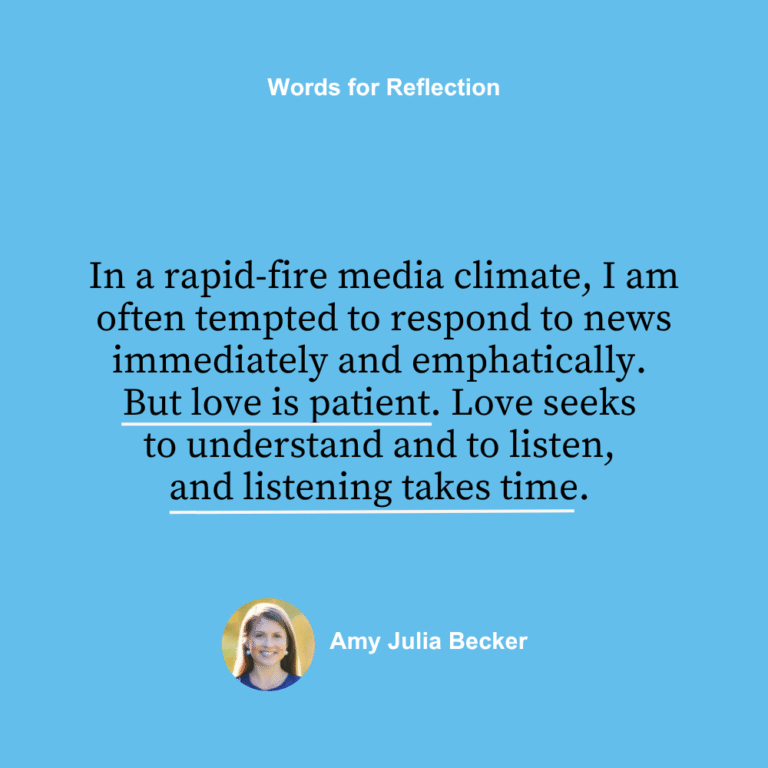Why This Matters: Practicing Faithful Presence Online
At The Colossian Forum, we often explore what it means to show up faithfully in the midst of tension — not just in personal relationships, but also in public conversations.
As Christian leaders and community members, we carry both a calling and a challenge: how do we speak with truth and grace in digital spaces that often reward outrage over understanding?
In this reflection, writer and speaker Amy Julia Becker shares thoughtful practices shaped by her years of engaging hard conversations at the intersection of faith, disability, and public life. Her words offer a gracious framework for discerning how and when to speak in online platforms — and what it looks like to cultivate peace and clarity in a noisy, divided world.
A Reflection by Amy Julia Becker

(Shared in full)
As the mother of three kids, including a 19-year-old daughter with Down syndrome, I write about disability, family, and culture. I tell stories about our family and reflect upon our culture from a biblical framework that will help us all to challenge the assumptions about what makes life good, proclaim the inherent belovedness of every human being, and envision a world of belonging where everyone matters.
Usually, writing about these topics means I comment on a movie with a person with Down syndrome, share some recent research about churches and disability, or explain why our whole community benefits when we cross the social dividing line between typically developing and disabled kids. But at times, these topics turn political. There was the time when President Obama made a joke about the Special Olympics, and the time when President Trump mocked a disabled reporter. There are the debates about disability and abortion rights. There are opportunities to comment on legislation that could adversely affect people with disabilities, like the current One Big Beautiful Bill Act.
We all exist within some sphere of influence, whether through conversation with a group gathered around the dinner table or through an Instagram account with 100,000 followers. And we all exercise some measure of discernment in choosing when and how to talk about potentially divisive issues. Over the years, I’ve come to a few conclusions about when and how to engage, especially in the online space.
- Offer informed opinions. I have opinions on all sorts of things, including the amount of money Americans spend on professional sports and whether or not cats should be declawed. But I only post opinions about the things I really know about. I have a Master of Divinity, and I am the mother of a 19-year-old with Down syndrome. I’ve read, researched, and written about faith, family, and disability for almost two decades now, so I have some measure of authority and expertise on these issues.
- Offer opinions slowly. In a rapid-fire media climate, I am often tempted to respond to news immediately and emphatically. But love is patient. Love seeks to understand and to listen, and listening takes time.
- Seek to build up. For example, after the Dobbs decision, I wrote an essay explaining why both sides of the abortion debate have it all wrong. When I showed it to a friend, she said it wasn’t my typical tone. I had vented my frustration rather than caring for vulnerable people. I never posted that essay. Instead, I wrote a prayer that acknowledged the hurt on both sides.
- Engage with kindness. When people disagree with me in comments, I seek to affirm whatever I can in what they are saying, thank them for offering a different perspective, ask a question to try to go deeper, and also explain why I disagree (assuming I still do. I also try to admit when I’m wrong.). And, sometimes, if the language becomes dehumanizing or there is no good faith engagement, I decide it is time to walk away.
I don’t always get it right. I certainly don’t convince everyone to see issues according to my point of view. But, with Jeremiah 29 in mind, I have found that even in the ecosystem of the internet, we can grow gardens that bear nourishing and beautiful fruit.

How Are You Using Your Voice Online?
In a digital culture shaped by speed, certainty, and division, Amy Julia’s posture invites something different: thoughtfulness, humility, and hope. Whether you have 100 followers or 100,000, her reflection is a helpful guide for anyone seeking to honor Christ in public conversations online.
What kind of tone are you setting in your digital spaces? What kind of fruit is growing?
Keep Learning from Voices Like Amy Julia’s
If you found this piece meaningful, we encourage you to explore more of Amy Julia Becker’s work. Her writing consistently invites deeper reflection on disability, belonging, and spiritual formation — and models what it means to speak with both courage and compassion in a divided world. You can find her latest essays, books, and podcast at amyjuliabecker.com.
To receive more reflections like this from thoughtful Christian leaders, sign up for our Hope in Your Inbox newsletter. You’ll be the first to hear from writers like Amy Julia, and you’ll gain access to new tools, practices, and stories designed to help you navigate tension with hope.